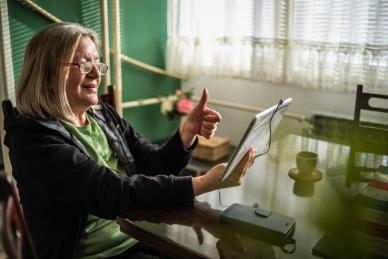
Art Appreciation: Indigenous Artwork- Sami, Aboriginal, Native American and more
Course details
Course code
Q00015407Course date
Number of classes
5 sessionsTimetable
Tutor
Caroline LevisseFee range
How you'll learn
Venue
OnlineLevel of study
Entry Levels 1,2,3: If you have never studied this subject before and you’re not confident in your skills, Entry levels are a good starting point.
Level 1: Covers basic skills and knowledge needed for this subject
Level 2: Building on basic knowledge or experience. Similar to Grade 4/ C at GCSE or O level in England or Standards in Scotland.
Level 3: Learn about the topic in-depth and have a broad range of skills. Independent working Equivalent to an A level in England or Higher in Scotland.
Beginners: A perfect introduction if you have no experience and skills in this subject.
Improvers: The next step if you have basic skills or knowledge but want to progress them further.
Advanced: Build on the solid experience and skills you have in this subject, applying your skills and knowledge in a more complex way.
Course overview
Course description
Indigenous people are the earliest known inhabitants of an area, and their descendants. According to Amnesty International, there are more than 5,000 indigenous peoples in the world today, representing just under 6% of the world’s population. In the introduction, you will learn about the concept of “indigenous people” and its history and will discover a lot of groups, throughout the globe. Their strong link to their territory and the natural environment will become clear, as well as the way they have maintained ancestral traditions, including arts and craft. In the subsequent sessions, we will focus on the art and culture of a few of these indigenous peoples. Among others, we will study the artistic traditions of the Inuit in today’s Canada, the Navajo in the U.S., the Sami in Scandinavia, the Dayak in Borneo, and the Aboriginal Australians. The objects studied will sometimes be paintings and sculptures, but we will also study pottery, textile, jewellery, and masks. Many of these art objects were created with a functional or religious purpose in mind. As we study these works, we will encounter many instances of hybridisations, where the ancestral forms, techniques and materials fuse with those of the newcomers’ culture. As we study cultures and art objects that are usually under-represented in art museums, we will discuss issues of marginalisation, discrimination, and assimilation, as well as a relatively recent movement of defence of indigenous rights.
-
What financial support is available?
-
We don't want anything to stand in your way when it comes to bringing Adult learning within reach so if you need anything to support you to achieve your goals then speak to one of our education experts during your enrolment journey. Most of our courses are government funded but if you don't qualify or need alternative financial help to access them then let us know.
-
What other support is available?
-
All of our digital content, teaching and learning activities and assessments are designed to be accessible so if you need any additional support you can discuss this with the education experts during your enrolment journey and we will do all we can to make sure you have optimal access.

